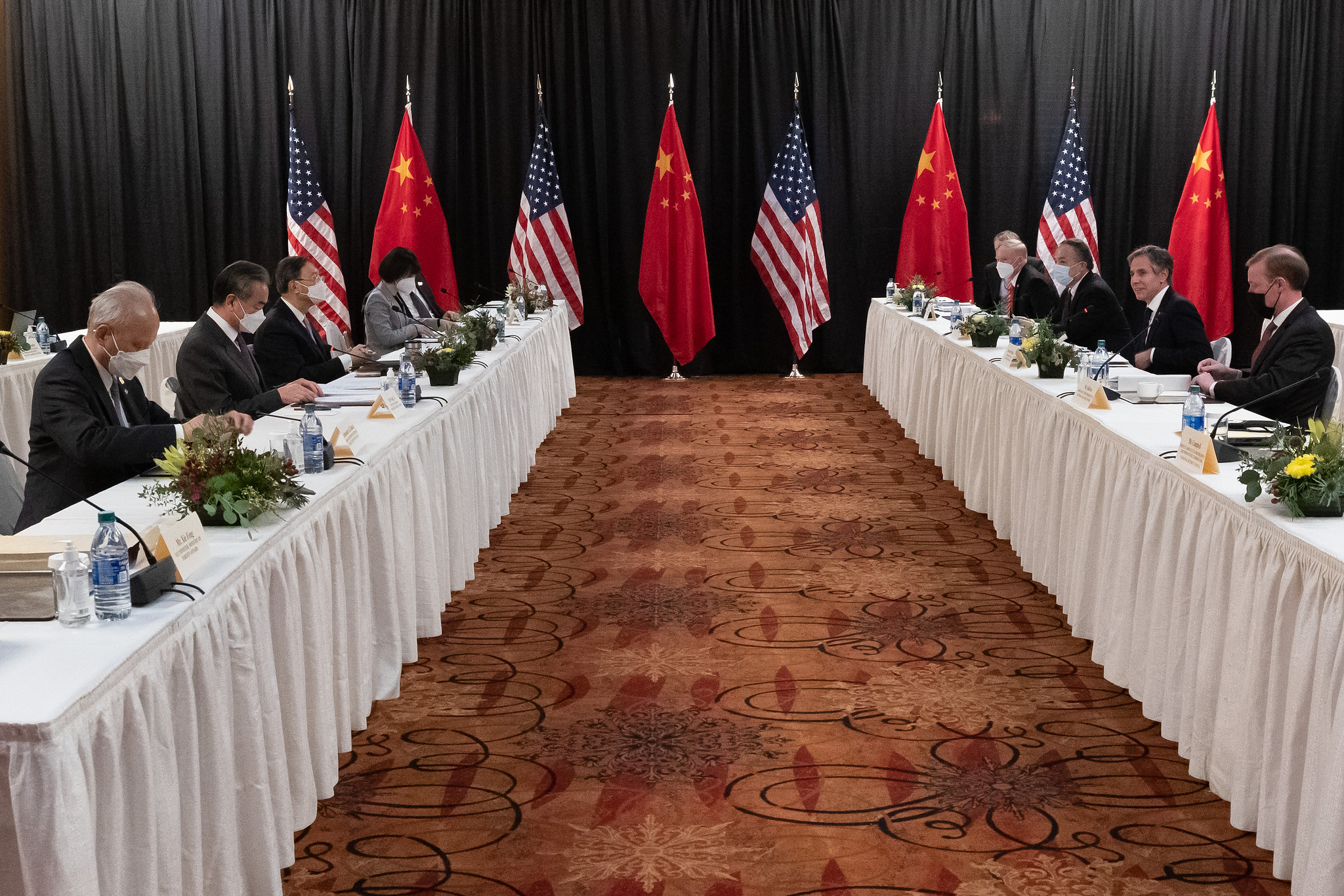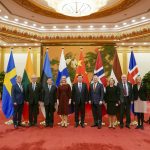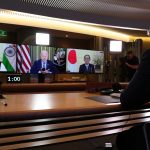
China Monitor is our brand-new program that analyses China’s economic and foreign policies. It also aims to predict the consequences of Beijing’s policy for the global economy, the EU as well as Central and Eastern European countries such as Poland.
Date: 26 March 2021
Author: Łukasz Kobierski
Anchorage Summit According to the Chinese Media
The first talks between senior US and Chinese officials were held in Anchorage, Alaska on March 19 and 20. The Chinese pro-government media outlets and people associated with the Chinese Communist Party commented on the tense atmosphere and mutual accusations among the participants. The Beijing delegation was widely praised for its “relentless and brave” stance, while the US, as usual, was criticized. Nevertheless, the summit was well received.

The most important participants of the meeting included: US Secretary of State Antony Blinken and National Security Advisor Jake Sullivan representing the USA as well as Chinese Minister of Foreign Affairs Wang Yi along with the member of the Political Bureau of the Communist Party of China (CPC) Central Committee and Director of the Central Foreign Affairs Commission Office of the Chinese Communist Party (CCP) Yang Jiechi representing China. The two-day summit generated considerable excitement around the world, including, of course, China.
Even before the meeting commenced, Chinese media had little expectation that it could produce any concrete results because of “offensive words” and actions of the US, including sanctions imposed on 24 Chinese and Hong Kong officials prior to the meeting over changes in the local electoral system. Some Chinese scholars suggested that China should reject the invitation of the US and cancel the meeting. Lü Xiang, a research fellow on US studies at the Chinese Academy of Social Sciences, compared the announced sanctions to “a host spitting on the table when inviting a guest for dinner.”
Hu Xijin, editor-in-chief of the Global Times, wrote on his Twitter account that “China and the US have never blamed each other in such an open and unceremonious way. It shows the era in which the US can pretend it has enough power and morality to talk down to China is over. It must treat Beijing in an equal and respectful manner.” In an article he wrote that
“the Chinese delegation helped the Chinese public vent the anger that had accumulated for several years.” He added that after such an argument, “subsequent dialogue will be more rational and pragmatic.”
Wei Jianguo, former Chinese Vice Minister of Commerce, said that the summit made it clear which side is good and which one is bad. He praised the anger expressed by the diplomats and their reactions to the defamations of the American side. According to him, as a result of the former conciliatory and cautious approach, China was wrongly perceived as a weak party that could be easily intimidated.
In his article for the China Daily, Liao Zhengrong, director of the Institute for Peace Development at Chinese Academy of Social Sciences, wrote that despite US concerns, mutual relations are beneficial for both countries, that they can inspire and develop each other. In another article of the Global Times, it was pointed out that trade is growing despite diplomatic tensions and that it could stabilize bilateral relations. Huo Jianguo, Vice President of China Society for World Trade Organization Studies, concluded that “while these trade issues are also complicated and thorny, they are much easier to address compared to the political differences.” Jin Canrong of Renmin University of China highlighted the poor qualifications and a lack of experience of the American side as compared to the Chinese delegation. Nonetheless, he regarded the summit as a good start since both countries defined their boundaries, established a working group on climate change, reaffirmed the “One-China policy” and agreed on the directions of future cooperation.
Support Us
If content prepared by Warsaw Institute team is useful for you, please support our actions. Donations from private persons are necessary for the continuation of our mission.
Chinese columnists argued that the meeting in Alaska demonstrated the need for the United States to change its understanding of major issues in bilateral relations and to abandon its “bossy” attitude toward China. “The US didn’t show any intent of shaking off Trump’s legacy and respect for China during the Alaska talks,” said Wu Xinbo, Dean of the Institute of International Studies at Fudan University, when commenting on the summit.
One of the Global Times’ articles concerned Alaska itself, which was described as the
“loser” of the trade war. After it began, high tariffs were imposed on seafood and timber, which are the main goods that the state exports. The analysis portrayed the losses that Alaska is suffering as a consequence of unnecessary trade disputes. For instance, Alaska’s seafood exports to China are down 46% from their record high in 2017, when trade was worth $1 billion.
On the basis the comments and reactions on the Internet, it could be concluded that its Chinese users were satisfied with and admired the counterattack of the Beijing’s delegation to, as it was called, “US side’s arrogance and aggression.” A number of them were proud to see how their homeland and its diplomats are becoming more powerful and fearless day by day. Some of the Internet users said that the tough stance of Chinese diplomats showed their determination to protect China’s interests. One of the most-viewed video clips on Weibo was that of Yang Jiechi, in which he says that “the US side is not qualified to speak to China from a position of strength.” Moreover, users of Weibo (“Chinese Twitter”) criticized the lack of respect and hospitality of the US delegation throughout the talks. A video clip in which Wang Yi asks Yang Jiechi if he had a lunch before the meeting and the latter replied “yes, instant noodles,” became popular. A hashtag “Yang Jiechi had instant noodles for lunch” was started by the CCP’s newspaper People’s Daily along with a video clip published by the China Global Television Network (CGTN), which shows that the CCP authorities deliberately brought this matter to the attention of the readers. This was probably related to reports by some Chinese news outlets that no formal dinner was held during the summit, for which the US was criticized in the media. In fact, the Chinese delegation was said to have agreed not to have a banquet due to the COVID-19 pandemic. Zhang Jing, the translator of Chinese diplomats, also became a hero on the Chinese Internet after effectively translating the whole 15-minute-long speech of Yang Jiechi.
Chinese media outlets and analysts pointed to, above all, the courage of the CCP diplomats and their rightful defense of China’s interests in the style of “wolf warriors.” Attempts were made to discredit the hosts as well as show America’s lack of culture and respect towards the invitees. Nevertheless, the summit was considered a success because, after the initial wave of anger, talks were held and initial agreements were made. Political relations will remain tense, but China hopes that it would be easier to find consensus in terms of economic matters. The media coverage was directed mainly towards the domestic audience in the PRC where nationalist sentiments are on the rise.
All texts published by the Warsaw Institute Foundation may be disseminated on the condition that their origin is credited. Images may not be used without permission.

















